All products and services are For Research Use Only and CANNOT be used in the treatment or diagnosis of disease.
Creative Biolabs has launched a wide range of anti-CEA CAR products, including CAR vectors, virus particles, cell lines, as well as one-stop customized solutions to support global customers’ projects.
Carcinoembryonic antigen (CEA), a member of the cell surface glycoprotein family, is widely expressed in a variety of tumors and has a great correlation with the malignant transformation of tumors. Studies have shown that high serum CEA levels are associated with poor prognosis in patients with colon and breast cancer. Therefore, CEA is regarded as a sensitive tumor biomarker and a potential therapeutic target for the therapy of many cancers.
Anti-CEA CAR-T Expression Test
Creative Biolabs provides many off-the-shelf CAR detection products and comprehensive assay services for CART expression tests for global customers to speed up the CART project.
Anti-CEA CAR-T Cytokine Release Test
Creative Biolabs provides customers with sensitive cytokine testing services covering a comprehensive range of cytokine types, such as IL-2, IL-6, TNF-α, and IFN-γ. Both extracellular cytokine-releasing test and intracellular cytokine test services are available at Creative Biolabs.
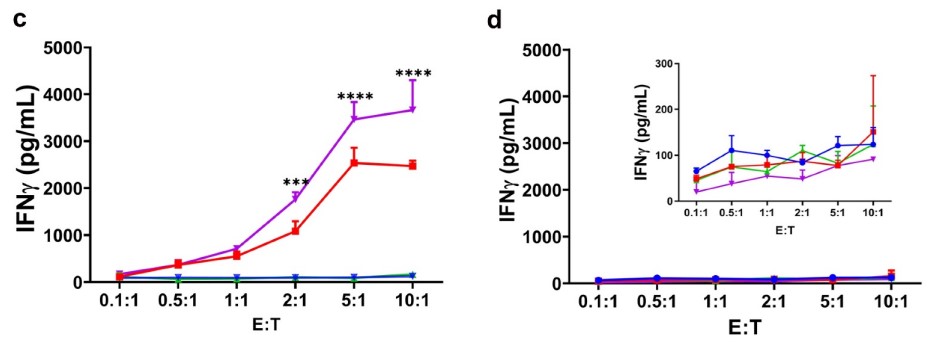 Fig.1 Cytokine detection of anti-CEA CAR-T cells incubated with CEA-GFP Colorectal cancer mouse model cells (c) or GFP Colorectal cancer mouse model cells (d) at indicated E:T ratios with anti-CEA-IL2 immunocytokine (ICK) addition. (Blue lane represents Mock; red lane represents CAR; green lane represents Mock+ICK; purple lane represents CAR+ICK).1
Fig.1 Cytokine detection of anti-CEA CAR-T cells incubated with CEA-GFP Colorectal cancer mouse model cells (c) or GFP Colorectal cancer mouse model cells (d) at indicated E:T ratios with anti-CEA-IL2 immunocytokine (ICK) addition. (Blue lane represents Mock; red lane represents CAR; green lane represents Mock+ICK; purple lane represents CAR+ICK).1
Anti-CEA CAR-T In Vitro Cytotoxicity Assay
In vitro tumor killing assay serves as a key test to confirm the target specificity and effectiveness of CART cells, and appropriate platform experiments can accelerate the entire CART development process. Creative Biolabs has launched several robust cytotoxicity assay services for measuring the cytotoxic potential of CART cells, such as LDH-based cytotoxicity tests, real-time cell cytotoxicity analysis, etc.
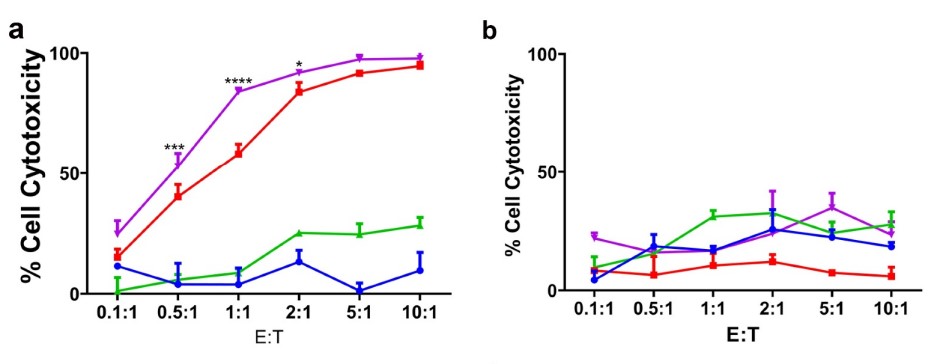 Fig.2 In vitro cytotoxicity of anti-CEA CAR-T cells against CEA-GFP Colorectal cancer mouse model cells (a) or GFP Colorectal cancer mouse model cells (b) at indicated E:T ratios with anti-CEA-IL2 immunocytokine (ICK) addition (Blue lane represents Mock; red lane represents CAR; green lane represents Mock+ICK; purple lane represents CAR+ICK).1
Fig.2 In vitro cytotoxicity of anti-CEA CAR-T cells against CEA-GFP Colorectal cancer mouse model cells (a) or GFP Colorectal cancer mouse model cells (b) at indicated E:T ratios with anti-CEA-IL2 immunocytokine (ICK) addition (Blue lane represents Mock; red lane represents CAR; green lane represents Mock+ICK; purple lane represents CAR+ICK).1
Efficacy Test of Anti-CEA CAR-T
For in vivo validation, we provide customers with a variety of animal models to choose from, such as xenograft, humanized, and transgenic models, as well as optimized experimental design to verify the effectiveness of the CART cells.
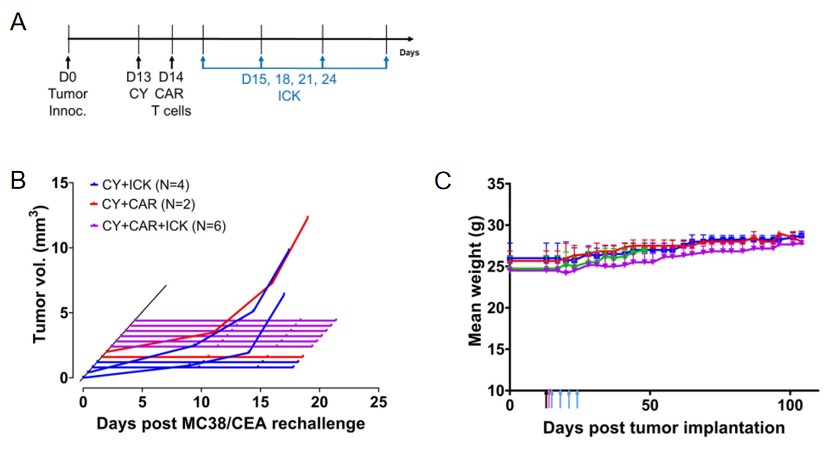 Fig.3 In vivo efficacy evaluation of anti-CEA CAR-T cells in CEA tumor-bearing CEATg mouse models (s.c. CEA) with the addition of anti-CEA-IL2 immunocytokine (ICK) or cyclophosphamide (CY). (A). Experimental design of in vivo efficacy validation of CEA-CART cells in subcutaneous CEA tumor-bearing CEATg mice. (B). Tumor volume measurement of mouse model after 45 days of being tumor-free with a tumor re-challenge. (C). Average weight measurement of tumor-bearing mice in each treatment group (Green represents CY only (n = 4); blue represents CY+ICK (n = 4); red represents for CY+CAR (n = 6); purple represents CY+CAR+ICK.).1
Fig.3 In vivo efficacy evaluation of anti-CEA CAR-T cells in CEA tumor-bearing CEATg mouse models (s.c. CEA) with the addition of anti-CEA-IL2 immunocytokine (ICK) or cyclophosphamide (CY). (A). Experimental design of in vivo efficacy validation of CEA-CART cells in subcutaneous CEA tumor-bearing CEATg mice. (B). Tumor volume measurement of mouse model after 45 days of being tumor-free with a tumor re-challenge. (C). Average weight measurement of tumor-bearing mice in each treatment group (Green represents CY only (n = 4); blue represents CY+ICK (n = 4); red represents for CY+CAR (n = 6); purple represents CY+CAR+ICK.).1
Persistence Test of CEA Expression after CEA CART Cell Therapy
After CAR-T cell treatment, antigen loss has been found and associated with relapse in hematological malignancies, which poses a great challenge for treatment persistence. To test the persistence effect of CART cell therapy, Creative Biolabs is committed to providing several effective methods to support CART development, including but not limited to the detection of various tumor samples in vivo.
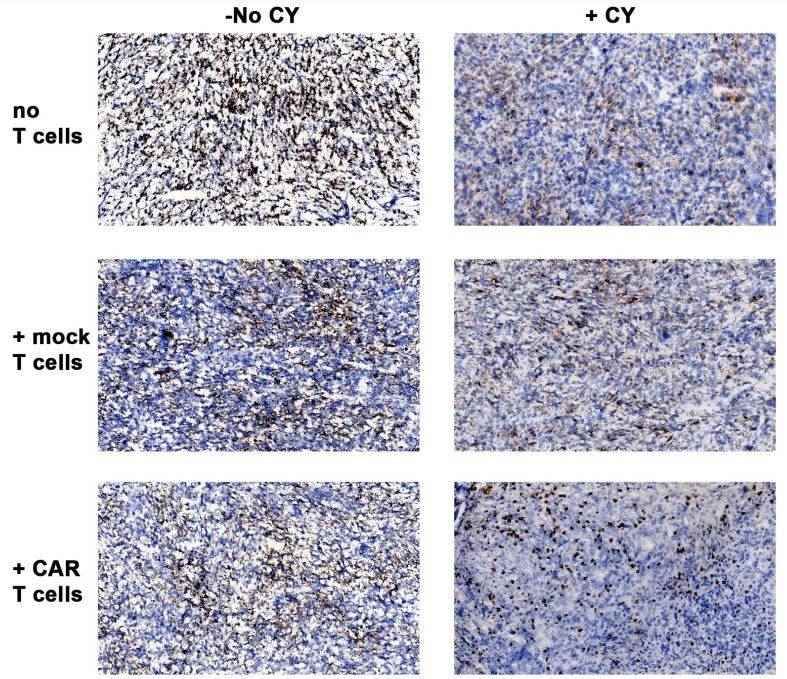 Fig.4 The CEA expression in CEA tumor specimens from CEA-CART cells treated CEATg mouse models (with/without cyclophosphamide (CY)) detected by immunohistochemistry.1
Fig.4 The CEA expression in CEA tumor specimens from CEA-CART cells treated CEATg mouse models (with/without cyclophosphamide (CY)) detected by immunohistochemistry.1
Immunophenotypic Analysis of CEA CAR-T Therapy Model
To explore the relevant performance and effect of CART cells at tumor sites in vivo, we have developed a variety of powerful immunophenotypic assays to provide more reliable validation data for our clients.
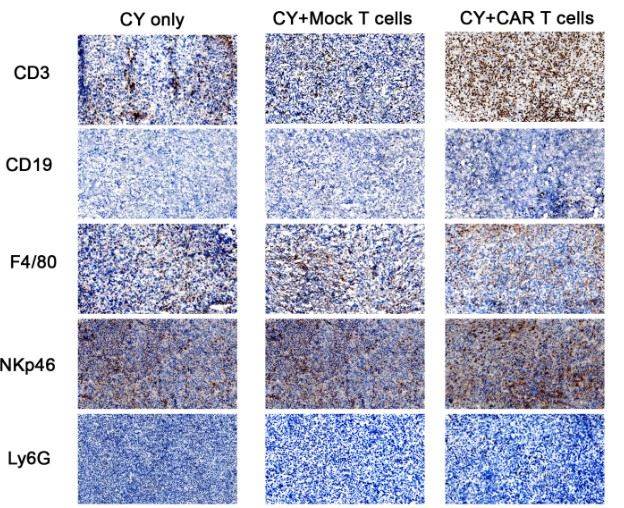 Fig.5 Immune cell infiltration test in CEA tumors from CEA tumor-bearing mice treated with CEA-CART cells with the combination of cyclophosphamide (CY). The collected tumors specimens were detected for several markers by immunohistochemistry (IHC): CD3 for T cells, CD19 for B cells, F4/80 for macrophages, NKp46 for natural killer cells, and Ly6G for neutrophils.1
Fig.5 Immune cell infiltration test in CEA tumors from CEA tumor-bearing mice treated with CEA-CART cells with the combination of cyclophosphamide (CY). The collected tumors specimens were detected for several markers by immunohistochemistry (IHC): CD3 for T cells, CD19 for B cells, F4/80 for macrophages, NKp46 for natural killer cells, and Ly6G for neutrophils.1
Toxicity Evaluation Anti-CEA CAR-T
In addition, we provide several CAR-T toxicity evaluation services to test the safety and potential side effects of CAR-T cell therapy. Our services include but not limited to on/off-target toxicology studies, and tumorigenicity analysis.
References
 Loading...
Loading...
| CAT | Product Name | Target Species | Antibody Clone | Antibody Host | Receptor Construction | Vector Type | Targeting Cell Type | CAR Vector Type | Inquiry & Datasheet |
| CAR-MZ106 | Anti-CEA (MFE23) h(CD28-CD3ζ) CAR, pCDCAR1 | Human | MFE23 | Mouse | scFv-CD28-CD3ζ | Retroviral | T cell | ||
| CAR-MV-01LX119 | Anti-CEA (MFZ) h(CD28-CD3ζ) CAR, pMMLV | Human | MFZ | human | scFv-CD28-CD3ζ | Recombinant Moloney murine leukemia virus (MMLV) retroviral vector | T cell | ||
| CAR-MV-01LX120 | Anti-CEA (H10) h(CD28-CD3ζ) CAR, pMMLV | Human | H10 | human | scFv-CD28-CD3ζ | Recombinant Moloney murine leukemia virus (MMLV) retroviral vector | T cell | ||
| CAR-MV-01LX121 | Anti-CEA (BW431/26) h(CD28-CD3ζ) CAR, pMMLV | Human | BW431/26 | human | scFv-CD28-CD3ζ | Recombinant Moloney murine leukemia virus (MMLV) retroviral vector | T cell | ||
| CAR-MV-01LX122 | Anti-CEA (F39-11) h(CD28-CD3ζ) CAR, pMMLV | Human | F39-11 | human | scFv-CD28-CD3ζ | Recombinant Moloney murine leukemia virus (MMLV) retroviral vector | T cell | ||
| CAR-MV-01LX123 | Anti-CEA (A5B7) h(CD28-CD3ζ) CAR, pMMLV | Human | A5B7 | human | scFv-CD28-CD3ζ | Recombinant Moloney murine leukemia virus (MMLV) retroviral vector | T cell | ||
| CAR-MV-01LX124 | Anti-CEA (MD45) h(CD28-CD3ζ) CAR, pMMLV | Human | MD45 | Mouse | scFv-CD28-CD3ζ | Recombinant Moloney murine leukemia virus (MMLV) retroviral vector | T cell | ||
| CAR-MV-01LX125 | Anti-CEA (MA39) h(CD28-CD3ζ) CAR, pMMLV | Human | MA39 | human | scFv-CD28-CD3ζ | Recombinant Moloney murine leukemia virus (MMLV) retroviral vector | T cell | ||
| CAR-MV-01LX126 | Anti-CEA (MFE23) h(CD28-CD3ζ) CAR, pMMLV | Human | MFE23 | human | scFv-CD28-CD3ζ | Recombinant Moloney murine leukemia virus (MMLV) retroviral vector | T cell | ||
| CAR-MV-01LX364 | Anti-CEA (MFZ) h(41BB-CD3ζ) CAR, pMMLV | Human | MFZ | human | scFv-41BB-CD3ζ | Recombinant Moloney murine leukemia virus (MMLV) retroviral vector | T cell | ||
| CAR-MV-01LX365 | Anti-CEA (H10) h(41BB-CD3ζ) CAR, pMMLV | Human | H10 | human | scFv-41BB-CD3ζ | Recombinant Moloney murine leukemia virus (MMLV) retroviral vector | T cell | ||
| CAR-MV-01LX366 | Anti-CEA (BW431/26) h(41BB-CD3ζ) CAR, pMMLV | Human | BW431/26 | human | scFv-41BB-CD3ζ | Recombinant Moloney murine leukemia virus (MMLV) retroviral vector | T cell | ||
| CAR-MV-01LX367 | Anti-CEA (F39-11) h(41BB-CD3ζ) CAR, pMMLV | Human | F39-11 | human | scFv-41BB-CD3ζ | Recombinant Moloney murine leukemia virus (MMLV) retroviral vector | T cell | ||
| CAR-MV-01LX368 | Anti-CEA (A5B7) h(41BB-CD3ζ) CAR, pMMLV | Human | A5B7 | human | scFv-41BB-CD3ζ | Recombinant Moloney murine leukemia virus (MMLV) retroviral vector | T cell | ||
| CAR-MV-01LX369 | Anti-CEA (MD45) h(41BB-CD3ζ) CAR, pMMLV | Human | MD45 | Mouse | scFv-41BB-CD3ζ | Recombinant Moloney murine leukemia virus (MMLV) retroviral vector | T cell | ||
| CAR-MV-01LX370 | Anti-CEA (MA39) h(41BB-CD3ζ) CAR, pMMLV | Human | MA39 | human | scFv-41BB-CD3ζ | Recombinant Moloney murine leukemia virus (MMLV) retroviral vector | T cell | ||
| CAR-MV-01LX371 | Anti-CEA (MFE23) h(41BB-CD3ζ) CAR, pMMLV | Human | MFE23 | human | scFv-41BB-CD3ζ | Recombinant Moloney murine leukemia virus (MMLV) retroviral vector | T cell | ||
| CAR-MV-01LX372 | Anti-CEA (A3B3) h(41BB-CD3ζ) CAR, pMMLV | Human | A3B3 | human | scFv-41BB-CD3ζ | Recombinant Moloney murine leukemia virus (MMLV) retroviral vector | T cell | ||
| CAR-MV-01LX373 | Anti-CEA (C2-45) h(41BB-CD3ζ) CAR, pMMLV | Human | C2-45 | human | scFv-41BB-CD3ζ | Recombinant Moloney murine leukemia virus (MMLV) retroviral vector | T cell | ||
| CAR-MV-01LX374 | Anti-CEA (SCA431) h(41BB-CD3ζ) CAR, pMMLV | Human | SCA431 | Mouse | scFv-41BB-CD3ζ | Recombinant Moloney murine leukemia virus (MMLV) retroviral vector | T cell |
 NEWSLETTER
NEWSLETTER
The latest newsletter to introduce the latest breaking information, our site updates, field and other scientific news, important events, and insights from industry leaders
LEARN MORE NEWSLETTER NEW SOLUTION
NEW SOLUTION
CellRapeutics™ In Vivo Cell Engineering: One-stop in vivo T/B/NK cell and macrophage engineering services covering vectors construction to function verification.
LEARN MORE SOLUTION NOVEL TECHNOLOGY
NOVEL TECHNOLOGY
Silence™ CAR-T Cell: A novel platform to enhance CAR-T cell immunotherapy by combining RNAi technology to suppress genes that may impede CAR functionality.
LEARN MORE NOVEL TECHNOLOGY NEW SOLUTION
NEW SOLUTION
Canine CAR-T Therapy Development: From early target discovery, CAR design and construction, cell culture, and transfection, to in vitro and in vivo function validation.
LEARN MORE SOLUTION